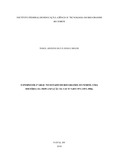O ensino de 2º grau no Estado do Rio Grande do Norte: uma história da implantação da Lei nº 5.692/1971 (1971-1996)

Visualizar/
Data
2018-04-06Autor
Carlos, Nara Lidiana Silva Dias
http://lattes.cnpq.br/3621958893761776
Metadado
Mostrar registro completoResumo
This master theses focus on the organization of second degree education on the state of Rio Grande do Norte during the validity of the Law 5.692/71, between 1971 and 1996. Its investigation focus on three specific objectives: to analyze the technique teaching on the national context parting from the promulgation of the Law 5.692/71 and the normative set that established teacher´s training during the military dictatorship; to investigate the Rio Grande do Norte state actions to implement second degree teaching between the years of 1971 and 1996; and to analyze the qualifications and the curricula of the second degree teaching offered by the state professional schools since the promulgation of the Law 5.692/71 and its possible relation with economy and local labor market. To achieve these subjects, we question: how did high school has been organized in Rio Grande do Norte from 1971 to 1996? Which schools assumed professional education in the state? Which where the qualification and the professional curricula stablished to second degree schools? Where these curricula connected to economy and to local labor market? The theoretical references are based on the concepts of history theory and political history, state and culture, reproductive education and power, and professional education, following authors such as Rusen (2010); Le Goff (1990); Bourdieu (1989, 2011); Rémond (2003); Cardoso and Vainfas (2012); Schultz (1967, 1973); Bobbitt (2004); Skinner (1972); Silva (2010); Gramsci (1979, 2001); and Chartier (2002). Germano (2011); Cunha (2005); Romanelli (2014); Freitag (2005); Saviani (2013) based the contextual analysis of education at the time. The indiciary paradigm, established by Ginzburg (1989) was important to the document analysis. Methodology started by bibliographic research and developed to document analysis collected in the Education and Culture Secretary of State. The results show that the second degree teaching in Rio Grande do Norte did no present explicit or homogeneous organization on the decades in focus. Though professional education have been offered on the four mesoregions in the state, it was not possible to verify a pattern or model to its implementation.It was also possible to observe that political relations interfered and dictated second degree organization along the period analyzed, demonstrating how strong oligarchical alliances were and still are; Another intriguing fact was the impossibility to establish a direct relation between the qualifications that were offered by the state and the labor market, because some economical areas were important to some regions but did not have the necessary attention and offert.
Keywords: Second degree teaching. Rio Grande do Norte. Law n° 5.692/71. History of Education. Professional Education.



